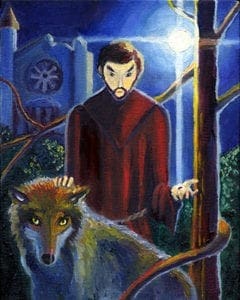Taming the wolves that prowl through our hearts
By LORRAINE V. MURRAY, Commentary | Published September 22, 2016
Huge, hungry wolves with evil-looking snouts stalked me in my childhood nightmares. Sometimes I even thought I spotted one—lurking behind the bedroom curtains—when I was awake, and would then implore my sister to protect me.
“Do you see him? Right over there!”
“It’s just your imagination,” she muttered. “Go to sleep.”
“Are you girls still up?” our mother yelled—and that was the end of the discussion.
Really, when you think of all the fairy tales featuring this particular animal, is it any wonder I was afraid of them?
The big bad wolf was a definite threat to the three little pigs, and as for Little Red Riding Hood—well, the thought of a wolf masquerading as someone’s dear old granny really unnerved me.
When I became a teenager, my older cousins couldn’t wait to take me to a werewolf movie—where I covered my eyes during particularly gruesome scenes.
Fortunately, in school I got a different perspective on these creatures when I learned about the legend of St. Francis of Assisi, who tamed a wolf that was stalking and killing people in Gubbio, Italy.
After the villagers implored his help, Francis found the wolf, made the sign of the cross over it—and chastised the creature for killing people.
According to the legend, the wolf told Francis he’d been injured and couldn’t keep up with his pack—so wreaking havoc on the villagers was the animal’s only means of survival.
Keep in mind Francis was known to be a holy, humble man who had given up everything to follow Jesus—and even bore the wounds of the Passion on his body.
And perhaps the wolf glimpsed a spark of holiness in this man’s eyes, because he agreed to a deal. If the villagers provided the animal with food and promised not to kill it, the wolf would abandon its bloodthirsty ways.
The beast then placed his paw in Francis’ hand and reclined at the humble man’s feet, calling to mind the passage in Isaiah: “The wolf shall dwell with the lamb: and the leopard shall lie down with the kid: the calf and the lion, and the sheep shall abide together, and a little child shall lead them.”
“Perfect love casts out fear,” St. Paul wrote—and the legend seems like an eloquent example of his words. You see, Francis was filled with the compassion and light of Christ, and thus wasn’t afraid to approach an animal that easily could have killed him.
The tale reminds us that with God anything is possible. Even the worst sinner can be converted through the love of Christ—and even a dangerous enemy can become a friend.
Oddly enough, sometimes the enemies we must confront can exist in our own hearts. So on Oct. 4, when we celebrate Francis’ feast day, let’s ask for his help taming the wolves that threaten us. Materialism? Lust? Anger? Revenge?
Our Lord Jesus Christ tells us that sheep know their shepherd’s voice and will follow only him. Let’s pray to recognize God’s call in a world where other voices clamor for attention—and hope to become, in the words of Francis, “an instrument of God’s peace.”
Artwork is by Jef Murray. Lorraine Murray’s three comical, cozy mysteries, set at a small parish in Decatur, are ”Death in the Choir,” “Death of a Liturgist,” and “Death Dons a Mask.” You may contact Lorraine at lorrainevmurray@yahoo.com.